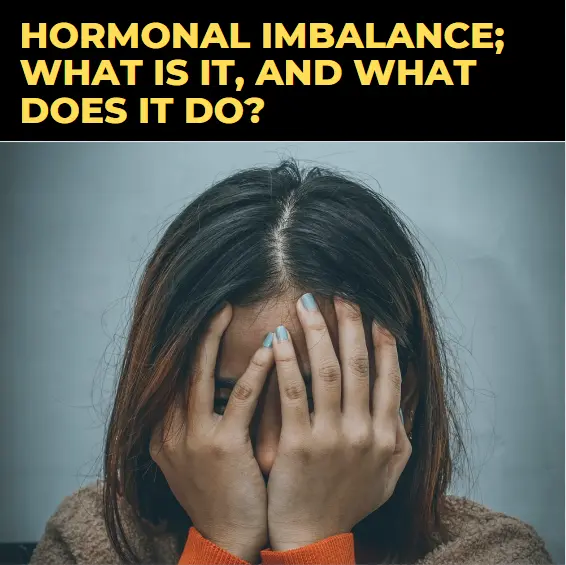
Before we delve into hormonal imbalance. We first need to introduce you to the endocrine system. The endocrine system is what creates hormones in the body. There are multiple endocrine systems in the body. Which include but not limited to ovaries, testes, and adrenals. These endocrine systems are responsible for creating their unique hormones. Such as testosterone, estrogen, and cortisol.
As the name implies, hormonal imbalance occurs when the production of hormones in either of these endocrine systems goes amiss. Additionally, when one hormone production is affected, it causes a domino effect and affects all other hormones.
Types of Hormonal Imbalance:
A flux or lack of hormone can cause different experiences for each human being. The most common hormonal imbalances includes cortisol imbalance, testosterone imbalance, estrogen imbalance, and, lastly, insulin imbalance.
Although they have brief symptoms defined to them, due to the previously mentioned domino effect a hormone imbalance causes on another imbalance, a single hormone imbalance may vary from person to person.
Low Testosterone and High Testosterone : Hormonal Imbalance
Although the word hormonal imbalance is widely considered an issue for women, imbalance does not discriminate. The testosterone imbalance is common in men and, although uncommon, can also be found in women.
With every passing generation, men’s testosterone level is mainly decreasing due to lifestyle changes compared to the previous generation. The root cause for most low testosterone cases is attributed to a higher amount of estrogen. The result of low testosterone can range from chronic stress, alcohol addiction, obesity, and low libido.
In contrast, high testosterone is most common in women even though testosterone is a hormone attributed to men. Even more surprisingly, most women with hormonal imbalances usually have high testosterone.
The ovaries produce this needless testosterone due to a lack of insulin. Thus, high testosterone cases are most commonly caused by a lack of insulin or insulin resistance. PCOS (Polycystic ovarian syndrome) is mainly attributed to an excess of testosterone. Besides PCOS, an increase in testosterone can cause oily skin, resulting in excess acne, facial hair, and even male pattern baldness.
Insulin and Cortisol Imbalance
Although insulin is a widely entertaining topic nowadays, you might not have known it is a hormone. Even more surprisingly. Insulin is produced by the pancreas, with its goal being to stabilize glucose distribution in the body.
An insulin imbalance occurs due to lack of exercise, consumption of sugar regularly, and being stressed daily. These factors can increase your body’s blood sugar level, which creates an insulin malfunction.
You set yourself on a one-way path to pre-diabetes, type 2 diabetes, and various health problems through an insulin imbalance. These include frequent headaches, blurry vision, lack of concentration, and dizziness.
On the other hand, cortisol is a stress hormone primarily produced by the adrenal glands. Under extreme and repeated stress. The ability of cortisol creation is interrupted. and your body compensates by creating excessive cortisol.
It can also go both ways, and your body may not produce enough cortisol. You may feel frequent fatigue, gain weight, and have an urge to frequently consume and severe cravings for sugary/addictive substances due to said hormone.
Estrogen Dominance
This is a common hormonal imbalance in women which occurs when estrogen is higher than progesterone or when progesterone is lower than estrogen and estrogen is normal.
It is prone to occur in people with obesity, chronic stress, and frequent exposure to xenoestrogens.
Estrogen dominance is known to cause extreme
- PMS
- frequent mood swings
- anxiety
- water retention
- bloating
- uterine fibroids
- migraines
- extremely painful and heavy periods.
Cures and Treatment options for hormonal imbalance
Although it is always better to consult with a medical professional, provided here are what you should expect and some standard treatments for hormonal imbalances.
For vaginal estrogen, symptoms of dryness, or pain during intercourse. It is advised that you apply an estrogen cream or tablet. Hormonal Birth control is also a helpful option to help fix your menstrual cycles, including birth control pills, patches, and shots. Additionally vaginal rings and IUDs are also recommended. Testosterone supplements are good for hypothyroidism.
They are also suitable for thyroid hormone imbalance and FDA-approved Flibanserin and bremelanotide for low sexual desire. It is also a functional cure for various hormonal imbalances.
Lastly, if you experience uncomfortable symptoms of menopause and frequent hot flashes, you may need estrogen therapy with your doctor recommending a low healthy dose of estrogen.


